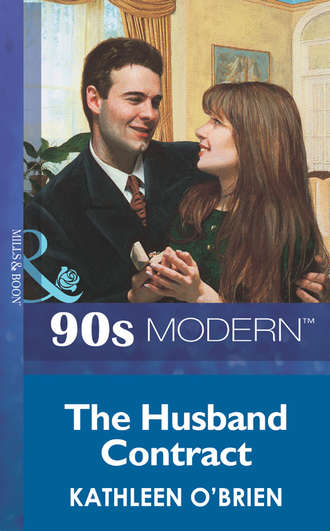
Полная версия
The Husband Contract
The woman’s long, square jaw tightened, and her black eyes, surrounded by dark smudges below and thick, slashing black brows above, narrowed. “I’ve been missing your uncle, that’s how I’ve been,” Mrs. Hilliard said flatly. “I don’t suppose you can say the same.”
If her life had been a children’s book, Melanie thought, like The Secret Garden or Pollyanna, Joshua’s housekeeper would have been rosy cheeked and cheerful, always ready to comfort the new little orphan with a hug, or a licorice twist, or a bracing bit of country wisdom. Instead, she had been like this. Cold, critical and painfully candid.
Melanie’s instincts told her she’d better establish new ground rules. She clamped her jaw shut, straightened to her full five-four and met the woman’s gaze straight on. “I believe Mr. Logan is expecting me, Mrs. Hilliard,” she said firmly, ignoring the woman’s question. And why shouldn’t she? It was a rude and nosy question.
The housekeeper blinked twice, then stood back, holding the door wide. “He’s in the library,” she said, her tone falling short of courtesy, but, at least for the moment, smothering the open hostility. After all, there was the off chance that Melanie might be able to claim her inheritance. Melanie hadn’t ever contended that Mrs. Hilliard was stupid. Just mean.
The housekeeper left her to find her own way to the library, which was at the extreme end of the entry hall—a hall that by itself was almost as big as her whole house in Sewage Basin Heights.
But something was different today…. She looked toward the curving central staircase and finally realized that two workmen were kneeling on the steps, pulling up the carpet. They talked softly in some melodic foreign language, and one of them even whistled while he worked. Their chatter paused as she passed, and they smiled at her.
She smiled back, grateful for the sense of life and energy that their presence lent to the house, which was usually as silent as a crypt. During Uncle Joshua’s reign, workmen never whistled.
Oh, how painfully vivid the memories were—how miserable she had been here! She felt her resolve hardening and quickened her steps. She deserved this inheritance, by God. Joshua owed her something for all those lonely years.
When she finally reached it, the dark-paneled library door was tightly shut, just as it had always been in her uncle’s day. She considered barging in, but old habits died hard. So she knocked, but she knocked briskly, determined to arrive with confidence.
“Damn, damn, damn! Who the hell is that?”
They were her uncle’s words. Joshua always cursed whenever the phone rang or a knock sounded at the door. Antisocial by nature and by habit, he always assumed that any contact from the outside world would be a nuisance.
Melanie put out one hand to steady herself on the paneling, but then she remembered. Not her uncle, of course not It must be Copernicus. How could she have forgotten Copernicus? Her uncle’s parrot, a bird as ill-tempered as its owner, had been uncannily precocious about picking up swearwords. His talents had delighted Joshua, who had taught him to be profane in six languages.
“Who is it? Who the hell is it?” The parrot was still posing the question querulously when Clay Logan opened the heavy door. The library within was dim. Though its domed ceiling rose to a huge skylight in the center, on a rainy day nothing but gloom came through. All that mahogany paneling was positively funereal—so it took her a moment to realize he was holding a magnifying glass in one hand and a map in the other.
He waved her in with the map hand. “Melanie. Come in. I’m just finishing up here, but for God’s sake, come show yourself to Copernicus before he has a stroke.”
“He won’t have a stroke,” she assured him, her tone slightly acid. “He thrives on irascibility. Just like my uncle.”
But she walked over to the old parrot anyway and presented herself in front of his perch. She had been sixteen the last time she saw Copernicus. The bird was silent as if he’d recognized her but couldn’t believe his eyes. He shifted from foot to foot and bobbed nervously, watching her through first one eye and then the other.
“Good Lord, he’s speechless.” Clay had retreated to the big carved desk in the middle of the room, but he’d looked up from the map he’d been studying and was observing their interplay curiously. “That’s a first”
“Oh, he’ll recover. He’ll be swearing at me in Portuguese pretty soon.”
Clay chuckled and went back to his perusal of the map before him. Looking at him, Melanie felt a strange confusion in the pit of her stomach. He had explained that he was staying at Cartouche Court for a while, appraising her uncle’s antique map collection, but somehow actually seeing him behind that desk was a shock. Joshua had spent so many hours there, bent over those same maps.
And yet Clay couldn’t have looked less like her uncle. Joshua’s interest in the collection had been dry, brittle, precise. The only emotion they evoked in him was greed.
In contrast, Clay seemed to be all vibrant masculinity even in repose. With his shirtsleeves rolled back to his elbows and his aristocratic profile bent over the mottled paper, he seemed excited by the map, more like an explorer than an academic. A ship’s captain, perhaps, or a warring king studying the charts that would lead him to some new, exotic adventure, some thrilling conquest.
Melanie mentally shook herself. What nonsensical fancy was this? Clay Logan might have walked into her life as a black knight, but he was just an ordinary man, nothing more, nothing less. The fact that her uncle had given him so much power over her future was making her imagine things.
Striving for a more natural air, she strolled toward the desk and stole a peek over his shoulder. The map was very old, its colorful pictures quite strange and beautiful. Ships and sea monsters lurked in the oceans; heraldic emblems decorated the borders, while in each corner a face with puffed cheeks blew the four winds toward the land.
“It’s fourteenth century,” Clay said. He ran a long forefinger across the youthful, garlanded head of Zephyrus, the west wind. “Hand colored. Beautiful, but not terribly accurate. I would have hated to try to use it to actually get anywhere.”
She looked again. “Well, at least it warns you where not to go. It shows quite clearly where the monsters are.”
“True.” Leaning back, Clay gazed up at her thoughtfully. “The only problem is that they were wrong. The most terrifying monster on this map swims in what’s now the best fishing water around the Bahamas.” He smiled. “Like many people, mapmakers created monsters out of their own ignorance. Out of their own fears.”
His smile seemed slightly wry. Did that comment carry a double meaning? Was he suggesting that she had demonized Uncle Joshua out of her own insecurity? Watchful of her temper, she chose not to address that issue.
“I can sympathize with that,” she said. She hoped she sounded confident, only slightly self-effacing. “I certainly let my fears get away from me when you came to Wakefield the other day. I want to apologize for flying off the handle like that.”
He was still smiling. “No apology is necessary. I expected you to find the terms of Joshua’s will disagreeable. I wasn’t at all surprised that you decided I was one of your monsters. How are you feeling now? Has your attorney had time to look over the will?”
“Yes,” she said uncomfortably. He must know what her lawyer had said. If she still cherished any hopes of getting the will thrown out, she would never have come here. “He tells me that my uncle’s will is quite legal and probably unbreakable.”
“He must be an unusually ethical man, then,” Clay said, sounding surprised. “A lot of lawyers would assure you it was worth a try, just so they could bill you for hundreds of hours of ‘trying’.”
She bit her lower lip, wondering how honest she needed to be. Completely honest, she decided unhappily. A woman mature enough to inherit twelve million dollars didn’t shrink from confronting an embarrassing fact or two.
“Well, he didn’t really have any incentive to mislead me. I asked him to take the case on a contingency basis. He wouldn’t have earned a cent if he hadn’t overturned the will.” She lifted her chin. “I can’t afford to contest this will frivolously, Mr. Logan.”
“Then don’t contest it at all,” he said softly. “Your uncle wanted a will that would stand up to any challenge, and that’s what I gave him.” Standing, he came around the side of the desk. “Look, Melanie, I’ve got an idea.”
His smile was warm and utterly charming, which made her instantly suspicious. Warm, charming people didn’t ordinarily work well—or very long—with Joshua Browning.
“Since you’ve acknowledged that I’m not technically a monster,” he said, his tone teasing. “why don’t we start over? We’ll sit down, you’ll agree to call me Clay, and we’ll talk this whole thing over calmly.”
She nodded slowly, banishing the suspicion. This was, after all, what she had hoped would happen. Calm. Cooperative. That wasn’t so hard. She could do that
“Good. How about over here, then?” Clay gestured to a large leather sofa directly under the skylight, the most cheerful spot in a room like this. Its only drawback was that it faced a small, strange display of antique handcuffs and thumbscrews that Joshua had collected over the years. More obsession with power.
But rather than quibble with Clay’s choice of seats—that was no way to start a cooperative chat—Melanie sat, settling herself at an angle to the display. If she didn’t turn her head much, she couldn’t even see the nasty little items.
When she leaned back, though, the sofa suddenly hissed and writhed beneath her. She leaped to her feet, startled beyond speech. A very large reddish-brown cat—so like the color of the sofa that she hadn’t even seen it—was huffily rearranging himself, angry at the disruption but too lazy to get out of the way.
Clay laughed and, reaching over, dumped the fat, furry feline unceremoniously onto the floor. “Get lost, Fudge. You’re in the way.”
“Damn cat,” the parrot complained from his perch. “Useless beast.”
Melanie stared from Copernicus to the cat, then turned her bewildered gaze to Clay. She finally found her voice. “Is that yours?”
Clay shook his head, patting the now-empty spot, encouraging her to take her seat again. “Good Lord, no. That lazy feline belonged to your uncle.”
“Joshua had a cat?” Melanie tried to picture it. For years, she and Nick had begged their uncle for a pet, but he’d always refused. Too much hair, too much trouble. And now—this? “My uncle hated cats. He never had a cat in his life.”
“I gave this one to him a year ago,” Clay said mildly.
“Fudge shared tuna sandwiches with him, ate them right off his plate.” He eyed her speculatively. “You’ve been gone a long time, you know. A lot can change in eight years.”
“Obviously.” She sank onto the sofa, a little dizzy suddenly, slightly disoriented. She felt like the blindfolded player in that old children’s game, twirled first this way and that until she had no idea which way she was facing.
It had been a mistake to come here. She should have waited until Monday, when she could have met Clay in his office. This place had too many memories, too much emotional residue. Right now, her thoughts were so off balanced that she wondered if she could even find the words to state her case.
“I think I’d better just come straight to the point,” she said, her voice hardly as steady as it should be. “Nick is at a ball game with a friend, but they’ll be back soon.”
“Okay,” he said, settling comfortably against the sofa.
“I’m listening.”
“Okay,” she echoed. Her voice sounded hollow in her ears.
“As you may have guessed, I want to talk to you about Joshua’s will. I…well, I wanted you to know that, in spite of what my uncle may have told you about me, I really am not a crazy teenager anymore. I’m twenty-four. I work. I live a perfectly sensible, even frugal…”
She hesitated. His gaze was curious, polite, but somehow unnerving. This was going to be much harder than she had anticipated. And perhaps, though these were the words she’d practiced in front of the mirror, she was going at it all wrong. Even she could hear that she still sounded angry, defensive.
She started over. “I want my inheritance, Clay. I believe I deserve it, and I’m willing to do whatever is necessary to convince you of that. Anything you need—credit reports, bank accounts, work references—I’m prepared to make it all available to you.”
He raised his brows. “This is a fairly dramatic turnaround, isn’t it? May I ask what happened to change your mind so completely?”
She flushed. “I’ve already admitted I overreacted. I’ve given this a lot of thought since that afternoon. In fact, I’ve thought of almost nothing else. I’ve realized that I have nothing to hide, nothing to fear from an inspection of my finances or my lifestyle.” She tried to smile. “You just reminded me that a lot can change in eight years. You’re right. Perhaps my uncle changed—I don’t know. But I do know that I changed, a lot. In fact, if you’ll give me a fair chance, you’ll discover that I’m a very different person from the headstrong girl my uncle remembered.”
That much was certainly true, she thought, aware of how bitter the words tasted in her mouth. The old Melanie could never have spoken such conciliatory sentences, not for a hundred million dollars. Even now, if it wasn’t for Nick, she might happily have suggested that Mr. Clay Logan take the damn Romeo Ruby and—
“I’d like nothing better than to discover just that,” he said. She had to admit he handled his victory well—his smile wasn’t the least big smug. “I believe Joshua wanted you to have his estate if you were ready to handle it. It would please me to be able to turn it over to you.” He leaned forward. “I’ll have my secretary send you a list of everything I’ll need first thing Monday morning. We can get started right away.”
But she didn’t stand. She couldn’t allow him to dismiss her—not yet. Her needs were more urgent than she had let on.
“How long do you think it will take?” she asked, trying to sound calm, unharried. “I mean, for you to complete your…evaluation and make a decision?”
He frowned. “I don’t know. It depends on what I find. As you know, the will stipulates that you have twelve months in which to prove that you should inherit. I can’t imagine that it could possibly take that long.” He tilted his head, studying her face. “Why—is there some urgency?”
“Yes,” she said uncomfortably, plucking at the buttons that quilted the leather of the sofa. “You see, I really need to move—to get out of the house I’m in.”
“Are you behind in your payments?”
She colored again. “No, no, of course not. I don’t get ‘behind’ in my payments. It’s just that I need to get into a better neighborhood—a safer neighborhood. I’ll sell my house, of course, but I’m afraid that will take too long. We need to move very soon.”
Uh-oh. She was babbling, not outlining the measured logic of a sensible young woman. This wasn’t how it had sounded in front of the mirror. But then, the mirror hadn’t given her that skeptical look.
“Right now? What’s the rush?”
“It’s Nick,” she said miserably. Clay’s eyes changed. Of course it was Nick, his disappointed gaze said. But she refused to let herself get defensive. “It’s just that I’m afraid he’s falling in with a bad crowd.”
Clay leaned back, raising one brow. “If you think you can find a neighborhood that’s immune to ‘bad crowds’, I’m afraid you’re searching for an Eden that doesn’t exist.”
Suddenly Melanie felt something warm and furry against her calf. Fudge apparently wanted to make friends. She dropped her hand onto his silky fur and softly scratched. At least it allowed her to avoid Clay’s too-perceptive eyes.
“I know, but…well, Nick’s given up his old friends from school. Our circumstances are rather limited, as you may already know, so he just doesn’t feel like one of them anymore. It’s destroyed his self-esteem.”
“What has? Not being rich? The boy can’t respect himself just because he no longer lives at Cartouche Court? Didn’t he know that, when he left your uncle’s custody, he left the goodies behind, too? The status address, weekly allowance, the credit lines at all the best stores…”
She flushed. “You make it sound like the worst kind of snobbery.”
“Isn’t it?”
“No, it isn’t.” She heard herself getting angry, but she couldn’t help it. “You don’t understand. You don’t realize how tough a private boys’ school can be. The students are—well, it’s ruthless if you can’t keep up.”
“On the contrary,” he said, “I know exactly what it’s like.” Clay gave her another of those wry smiles. “I went to a private school, too. Four long years as a scholarship student. It’s no fun, but it’s survivable.”
She stared at him, finding the concept strangely jarring. She tried to picture Clay Logan at fourteen or fifteen. Even harder, she tried to picture him ever feeling at a disadvantage. Was it possible that this man had ever been racked with insecurity, rejected by the rich boys, forced to seek companionship with near delinquents?
No. It was not possible—he had too much inner strength. Granted, she didn’t know him very well, but his personal pride was evident in the way he carried himself. The perfect square of his shoulders, the firm set of his angular jaw, the nononsense expression in his intelligent eyes, were all the proof she needed. If Clay Logan had been shunned because he possessed more brains than bank account, he would simply have pitied his critics and comfortably spent the four years alone.
So how could she admit to him that Nick wasn’t made of such stern stuff? That Nick’s ego was fragile, his self-image built on all the wrong things. Did she dare say she blamed her uncle for that, too?
“I’m sure Nick’s hurting,” Clay went on. “And I’m sorry for it. But leaving Joshua was Nick’s own idea. He didn’t like the restrictions Joshua placed on him—and he hoped you would be a more lenient guardian. It’s really no surprise, is it, that there was a price to pay for his freedom? There usually is.”
“Yes, but the price is too high!” She pressed her fingertips together tightly, holding her emotion in with every muscle.
“He’s taken up with some new kids, kids from our neighborhood. These boys are much tougher than he is. He…” She hoped she wouldn’t fall apart, thinking of how Nick had looked at the police station, so young, so frightened. “He follows their lead. This week, they were caught spray-painting city hall.”
Clay’s brows pulled together in distaste. “Then the problem is in Nick, Melanie. Not in your address.”
Frustration pressed like a fist on her chest. “I understand what you’re saying. He should be stronger, I know. But I have to deal with Nick as he is, not as he ought to be.”
His face was implacable, and suddenly she realized she was just plain tired of begging—it was so at odds with her natural temperament. She had done all she could. If Clay couldn’t feel any sympathy for Nick, then she would have to find another way.
She stood jerkily, feeling like a fool. She had abased herself for nothing. “I apologize for wasting your time,” she said coolly. “I had hoped that perhaps you could expedite this…this cute little trial my uncle cooked up. If you won’t, you won’t I don’t need to bore you with all the details of our personal problems.”
Clay rested his head on the heel of his hand, still relaxed in spite of her tension.
“You’re flying off the handle again,” he pointed out.
“No, I’m just late getting home. Thanks again for—”
“If you really feel that Nick is in danger where you are,” he broke in calmly, “why not move back into Cartouche Court?” He smiled at her horrified expression. “I’m serious, Melanie. Why not? Joshua’s will specifically stipulates that you may live here, rent free, during the twelve-month evaluation period. Why not take advantage of his offer? Why not come home?”
Why not? A hundred thousand memories, all of them unhappy, that was why not. She looked helplessly around the library, half-expecting to see her uncle lurking in the dark corners. But the clouds had passed over—the shadows now were honey-colored.
“Come home?” she repeated hollowly. Was this home?
“Come home,” Copernicus ordered in a fierce voice that was eerily like her uncle’s. “Come home, damn it.”
It was obviously unanimous. Even Fudge wrapped himself around her ankle, purring. She stared numbly down at the cat, wondering why she was even letting herself consider this insanity. She leaned down to pet him, stalling.
“Damn cat,” Copernicus said sullenly, ruffling his feathers irritably.
Clay had stood now, too, and was studying her closely. “Why don’t you at least give it some thought? It would be financially advantageous for you, and it might even, as you say, expedite the work you and I need to do together. Fewer faxes, no phone messages to go astray.” He sighed. “I could even get to know Nick better.”
Get to know Nick…? She realized suddenly, with a nervous tightening in her gut, what he meant. “Oh, that’s right. You…you live here now, don’t you?”
“Yes.” He grinned, and for the first time, in the brightening sunshine, she could see the gold flecks in his brown eyes. “But I’m staying in the guest house, in case you’re worried about appearances.”
“Well, I would have to be, wouldn’t I?” she said dryly. “Considering that my character and my judgment are now officially on trial.”
He laughed as if he thought she was quite witty, but she knew it was no more than the truth. She was the defendant, and Cartouche Court was to be her jail. And Clay Logan was prosecutor, jailer, judge and jury all in one deceptively charming package. She closed her eyes. The prisoner was in big, big trouble.
CHAPTER THREE
IT WAS the wrong side of midnight. As was his habit before retiring to the guest cottage for the night, Clay strolled quietly across the upstairs hall of Cartouche Court, his body slicing through the alternating stripes of blue moonlight and black shadow as he double-checked doors and windows.
The hall was like a long, straight saber, cleaving the mansion’s eight bedrooms into two sets of four. He peered into each one as he passed, assuring himself that all was in order. With so many workmen coming and going, it couldn’t hurt to be careful.
It was like taking a walk through time and space. Joshua had decorated the bedrooms to reflect different nations or eras, each using an antique map as inspiration. The Chinese bedroom, then the Irish, the Crusades, the Civil War, the St. Croix…The interior of Cartouche Court was as varied as history itself.
But silent, Clay thought, standing at the top of the stairs, scanning the emptiness. Some nameless disaster might have swept all living things from the face of the earth, leaving behind only hollow suits of armor, stopped clocks, beds that no one slept in, books that no one read.
Well, all that would change tomorrow when Melanie and her brother arrived. The transformation had, in fact, already begun.
He moved to the Chinese bedroom and knuckled the door open slightly. Over the past week, the room’s simple elegance had given way to a strangely delightful chaos as Melanie’s things had been sent ahead to await her arrival.
He flicked on the overhead light, wondering what new nonsense had been delivered today. On Monday she’d sent a dozen boxes, which now were stacked on the Oriental carpet. Each carton was labeled in black marker, and the careless scrawl was as impractical as Melanie herself. “Odds and Ends,” she’d written, or “Boring Papers.”
Her clothes had come on Wednesday. Two bulging suitcases and then a half-dozen dresses in soft, feminine prints, sent loose on hangers. They surged like flower-laden waves over the red-lacquered chest in the comer.








